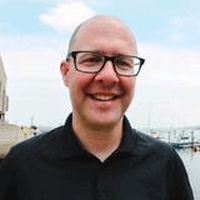My Favorite Moment of 𝘍𝘢𝘪𝘵𝘩 & 𝘍𝘪𝘯𝘢𝘯𝘤𝘦𝘴
I have the unique privilege of experiencing the Chalmers Center’s Faith & Finances program from two distinct vantage points: as chair of Chalmers’ board and as a facilitator of the class where I live in Oklahoma City. This dual perspective has given me insights into not just what this program accomplishes, but how it transforms lives in ways that go far deeper than budgeting basics.
At first glance, Faith & Finances might seem like what you’d expect from any financial education program. We cover essential money management skills specifically tailored for vulnerable populations. Participants learn about financial practices and systems, discover how to avoid predatory lending traps, and connect with crucial resources—sometimes getting their first bank account ever.
But these technical skills, important as they are, aren’t the secret sauce of Faith & Finances. It’s about something far more profound: helping people discover that they are known and loved by God, and that only He can provide the peace, healing, and freedom they desperately seek. This transformation happens as relationships are restored—with God, with others, with themselves, and even with their money.
My favorite moment in the entire 12-week journey happens without fail during week seven. By this point, we’ve been getting to know one another as real people with real stories. A genuine sense of community is emerging—a “we’re in this together” feeling. New ways of thinking are taking root. I always feel like the Kingdom of God is creating little cracks of light in what had seemed hopeless.
Then comes the week seven activity that always moves me. Each person—including me as the facilitator—writes out all of our assets on sticky notes. Not just financial assets, but everything: our physical possessions, our human capital like talents and skills and life experience, our relationships, our knowledge.
What happens in that moment is nothing short of sacred. As we stand together and take in all that we’ve been given, I watch as dignity and agency appear on the faces of people who had forgotten they had either. Where it is easy to think “I have nothing” and “my financial situation is hopeless,” a realization begins to take shape: God is actively at work in and around us, and He has already provided for us in countless ways.
Don’t get me wrong, this isn’t some magical solution that makes all financial struggles disappear. But I consistently see this moment as an inflection point—a moment when a spark of confidence emerges that the future can be better than the past, especially when we work alongside God and others to create change. We always pause to pray and savor this week-seven moment together.
If you’ve been considering engaging with Faith & Finances, I want to encourage you to take that step. There’s nothing quite like building authentic relationships with people who may face very different circumstances than your own, only to discover we actually have far more in common than we initially thought.
What I love most are the “I need you and you need me” relationships that emerge organically from Faith & Finances. These aren’t one-way relationships where some people have all the resources and others have all the needs. Instead, we discover that we all have something to offer and something to receive.
As a facilitator, I’m constantly challenged to examine how I steward my own resources and how I depend on community to thrive. The program has taught me as much as I’ve taught, if not more.
Faith & Finances represents something beautiful about how God works in the world. It’s practical and spiritual, individual and communal, addressing immediate needs while nurturing eternal hope. It recognizes that financial struggles are rarely just about money—they’re about dignity, agency, relationships, and ultimately, our understanding of how God sees and provides for us!


